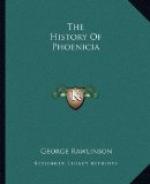The writing of the Phoenicians was, like that of the majority of the Semitic nations, from right to left. The reverse order was entirely unknown to them, whether employed freely as an alternative, as in Egypt, or confined, as in Greece, to the alternate lines. The words were, as a general rule, undivided, and even in some instances were carried over the end of one line into the beginning of another. Still, there are examples where a sign of separation occurs between each word and the next;[0139] and the general rule is, that the words do not run over the line. In the later inscriptions they are divided, according to the modern fashion, by a blank space;[1310] but there seems to have been an earlier practice of dividing them by small triangles or by dots.
The language of the Phoenicians was very close indeed to the Hebrew, both as regards roots and as regards grammatical forms. The number of known words is small, since not only are the inscriptions few and scanty, but they treat so much of the same matters, and run so nearly in the same form, that, for the most part, the later ones contain nothing new but the proper names. Still they make known to us a certain number of words in common use, and these are almost always either identical with the Hebrew forms, or very slightly different from them, as the following table will demonstrate:—
Phoenician Hebrew English
Ab {...} {...} father
Aben {...} {...} stone
Adon {...} {...} lord
Adam {...} {...} man
Aleph {...} {...} an ox
Akh {...} {...} brother
Akhar {...} {...} after
Am {...} {...} mother
Anak {...} {...} I
Arets {...} {...} earth, land
Ash {...} {...} who, which
Barak {...} {...} to bless
Bath {...} {...} daughter
Ben {...} {...} son
Benben {...} {...} grandson
Beth {...} {...} house, temple
Ba’al {...} {...} lord, citizen
Ba’alat {...} {...} lady, mistress
Barzil {...} {...} iron
Dagan {...} {...} corn
Deber {...} {...} to speak, say
Daleth {...} {...} door
Zan {...} {...} this
Za {...} {...} this
Zereng {...} {...} seed, race
Har {...} {...} mountain
Han {...} {...} grace, favour




